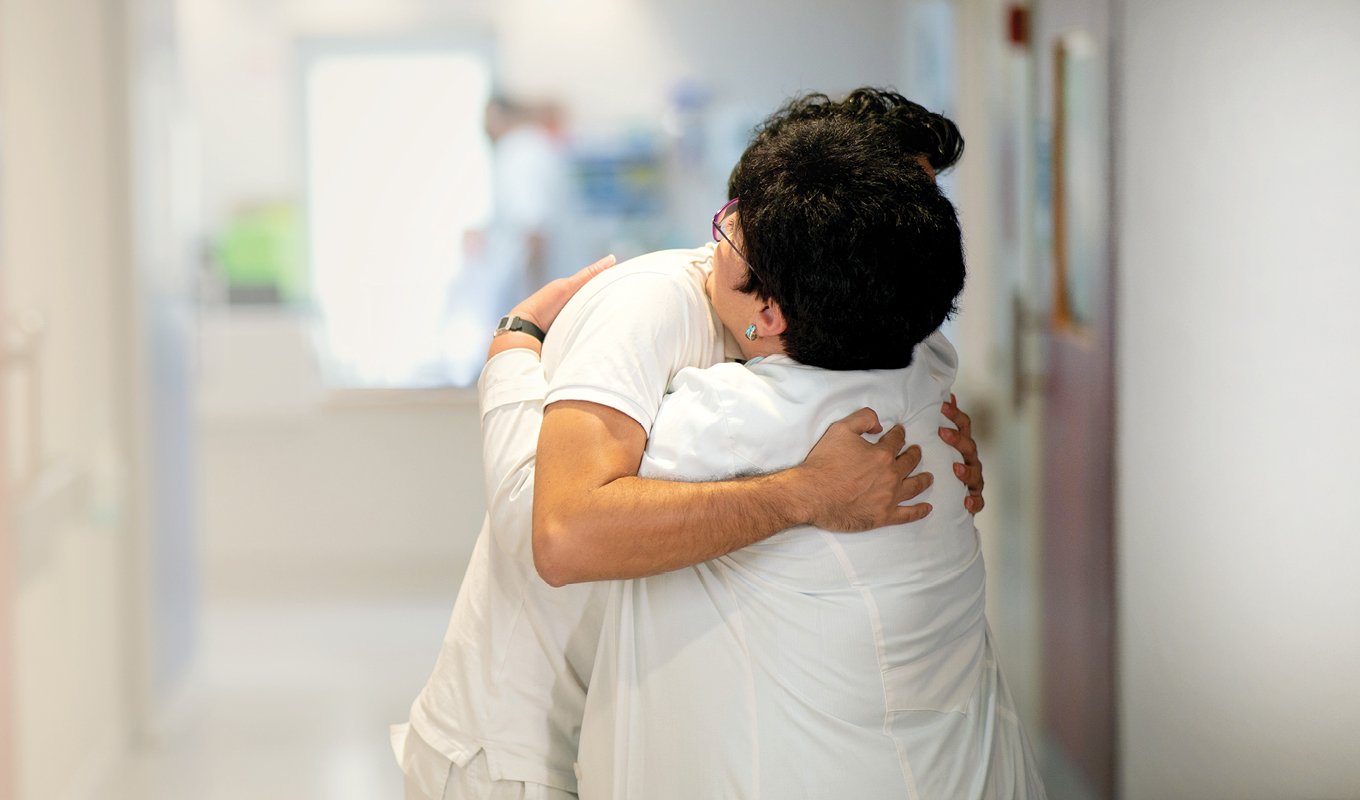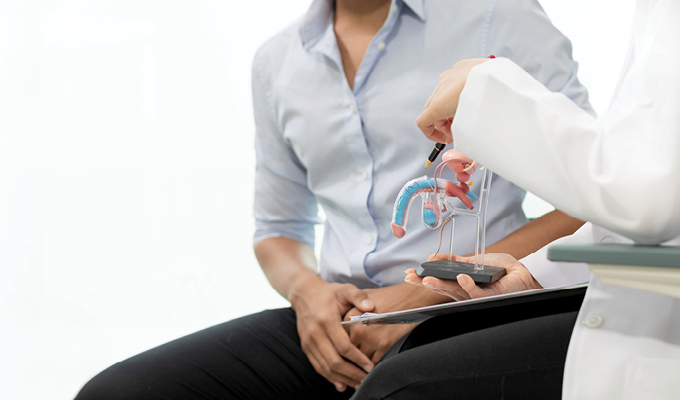Prof. A. Joseph Foldes is the director of the Jerusalem Osteoporosis Center at the Hadassah Medical Organization.
Transcription:
Melanie Cole, MS (Host): Tremendous advancements have been made in the management of weakened bones, but there's still so much work to do as awareness for those of us at risk with osteoporosis. Today we're talking with Professor Joseph Foldes on this episode ofHadassah On Call.
My guest today is Professor Joseph Foldes. He's the senior physician and the former director of the osteoporosis center at the Hadassah Medical Organization in Jerusalem. Welcome Professor. Tell us a little bit about yourself and how you came to Hadassah Medical Organization.
Prof. A. Joseph Foldes (Guest): Good evening Melanie and thank you for providing me with the opportunity to participate in this important podcast. It's a very interesting question because just yesterday I celebrated 40 years for working at Hadassah. All my life actually since I finished my military service as a medical officer I've been working at Hadassah. With the exception of two years which I spent doing research at the Henry Ford Hospital in Detroit.
Host: Wow. That is so interesting that you worked here in the states. So, let's talk about osteoporosis professor. What is it? Explain to listeners a little bit about what it is, and do we know what causes it? How would somebody even know if they have the early stages?
Professor Foldes: Generally speaking, osteoporosis is a condition of weakening of the bones leading to their increased fragility. The reason for this weakening of the bone is a combination of the amount or the density of the bone mass along with the changes of the internal structure of the bones and with internal properties like elasticity. It is more common in elderly women and men, especially in post-menopausal women. But it could occur at any age in both sexes provided there are some medical conditions or medications which are known to promote osteoporosis.
One problem with osteoporosis, an important one, is that the disease is symptomless. So, there are no signs, no symptoms that one can feel telling him that he is developing osteoporosis until the complication occurs. The complication is the osteoporotic fractures. So, it is very important to try and identify the condition before the fractures occur. That is why it is important in certain circumstances to undergo the test of bone density, which is done by a machine called DEXA, which is short for dual energy x-ray absorptiometry.
Host: Professor sometimes when we see people and their shoulders are all hunched, and their head is looking downward, we think osteoporosis and we don't want that to happen to us. What bones does it typically effect?
Professor Foldes: That's a very good question because interestingly, osteoporosis does not affect equally the whole skeleton, but there are several sites which there is predisposition for osteoporotic fractures. Those sites, important sites, include the spine, the spinal column where fractures of the vertebrae can lead to loss of height and to the development of kyphosis or bending. The second important location is the hip joints or the femurs with very dangerous femoral fractures that usually necessitate surgery and can also end up with a debilitating state. Other sites include the wrist, the ribs, the shoulder area, and the pelvis. These are the most frequently effected sites where the fractures occur.
Host: Professor is there a genetic component to osteoporosis? Also, is there a link between osteoporosis and menopause?
Professor Foldes: Well there is genetic contribution to osteoporosis, just like we know there is a genetic component for heart condition. But it's not a direct genetic transmission. Along with the genetic predisposition, of course, there's a lot of importance to environmental or lifestyle factors. Including physical activity, components of diet, smoking, normal hormonal development, et cetera.
Host: Then let's speak a little bit about, you mentioned the DEXA scan. Who should get this bone density test, professor, and what do the results mean? What are we to make of them?
Professor Foldes: Well I will go back to the end of your previous question. Osteoporosis mostly effects post-menopausal women because of the loss of production of estrogen, which is otherwise manifested as the menopause. But it is important to remember that osteoporosis can affect man men. The problem is that men are less aware of this condition and probably they are less aware of health issues in general. Also, they do not have that external sign of menopause, which women have.
So, the target population for measuring bone density by DEXA, in my opinion, is every woman who reaches menopause, every man about the age of 65, and any man or woman who is known to suffer from a medical condition that we know can promote osteoporosis. I will just give you a few examples. Celiac disease, multiple myeloma, hyperparathyroidism, or chronic steroid therapy. Just examples for conditions which can cause osteoporosis even in young men and women.
Host: If somebody is diagnosed with osteopenia, they are told that they have the softening, the weakening of the bones that we mentioned at the beginning. What is the first line of defense?
Professor Foldes: Well, you mentioned the term osteopenia. So, it is important to recognize that there is some difference between the term osteopenia and the term osteoporosis. Generally speaking, when we perform a bone density test, we categorize the result into three categories. One is normal bone, one is osteoporotic bone, and there is an intermediate condition which we call osteopenia. This is the most treated condition because once a person already has osteoporosis, usually we initiate treatment. What we can achieve by the treatment is usually arresting or slowing down further deterioration of bone density. We are limiting with our capabilities to restore the bone density. So that is why it is so important to try and recognize and identify conditions of osteopenia before fully developing osteoporosis. There we can intervene and try to slow down the bone loss and prevent the development of full-blown osteoporosis.
What we can do is we can divide it into two parts. One relates to measures of lifestyle measures, like promoting physical activity, encouraging physical activity, especially activity types which are involved with bone loading or weight baring exercises. Then there are several diet related factors. Especially we deal with the calcium and the vitamin D. There are recommendations for the amounts of vitamin D and calcium that need to be consumed after the menopause. We encourage smoking sustention if necessary. If the woman is relatively young and she has a spontaneous unnatural menopause at a young age, probably she deserves some hormonal replacement for some years.
All these measures we give them to patients with osteopenia or even with normal bone density, and as well as patients who have already developed osteoporosis. But if osteoporosis develops, then often we need to add medications. There are several medications on the market which are FDA approved. And all are approved after they underwent serious medical studies which shows that they reduce the risk of fractures significantly by about 50% compared to the control group which receives placebo. So, the purpose of the medication is not to correct the low bone density because that is something we cannot really do. We can only very partially correct the density. What we can do is significantly reduce the risk of future fractures.
Host: That's great information and so important for listeners to hear professor. Wrap it up for us what you want the take home message to be about osteoporosis, that risk of fractures which is so, so important, and even the dietary concerns. You mentioned vitamin D and calcium. Again, so important. Please wrap it up with your best advice as an expert what you would like us to take away from this episode.
Professor Foldes: I would like to spotlight three points. One is to carry on healthy lifestyle. Secondly to undergo bone density tests periodically at appropriate age. Finally, while I encourage the audience to read medical information publicly released in the media, it is very important that they will be aware of the limited availability to understand what they read. I speak specially about the fears of the side effects of the intervention which are often encouraged by media and publications. People should know that for every medication which is improved there is a risk of side effects. But the risk of benefits far, far outweighs the risk of side effects. I encourage that no one will abstain from medication or discontinue medication without consulting with your physician.
Host: Thank you so much professor for being on with us today and for sharing your expertise from so many years of working with patients that might have osteoporosis, or even the beginnings and the weakened bones and that risk of fractures. Thank you so much for coming on and giving us such important information. This is Hadassah On Call, New Frontiers in Medicine brought to you by Hadassah, the Women's Zionist Organization of America. The largest Jewish women's organization in America, Hadassah enhances the health of people worldwide through medical education, care, and research innovations at the Hadassah Medical Organization. For more information on the latest advances in medicine, please visit hadassah.org. To hear more episodes in this podcast series, please visit hadassah.org/podcasts. That's hadassah.org/podcasts. I'm Melanie Cole. Thanks so much for listening.
We'd love to know your thoughts, questions, and stories! Send us an email anytime at marketing@hadassah.org.



.svg)


